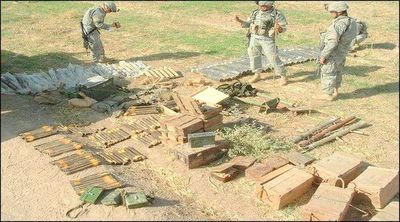
Iraqi Soldiers Capture Insurgents, Disarm Roadside Bombs
American Forces Press Service
WASHINGTON, Nov. 23, 2005 � Iraqi army troops from the 3rd Battalion, 4th Brigade, 6th Iraqi Army Division, captured three insurgents Nov. 22 in Baghdad, military officials reported.
Officials said the military-aged suspects were apprehended after they threw a CD containing sniper video footage from their vehicle at a traffic-control point and tried to turn around and get away. Iraqi troops questioned the three men, who admitted attacking coalition forces in Baghdad, Fallujah and Najaf, officials said. The men and materials were taken into custody pending further investigation.
Elsewhere in Iraq, Iraqi troops from the 2nd Battalion, 4th Brigade, 8th Iraqi Army Division, discovered two roadside bombs Nov. 22 near Iskandariyah.
The first bomb consisted of a 130 mm round with a three-foot detonation cord. The second bomb was found in a pre-existing hole with wires protruding from a 152 mm round and two propane tanks. The bombs were neutralized, and no injuries or damages were reported.
Task Force Baghdad soldiers detained three suspected terrorists during an early-morning Nov. 22 raid in southern Baghdad. Soldiers assigned to the 3rd Battalion, 7th Infantry, also found multiple passports along with an 82 mm mortar round while searching the house of the terror suspects.
A large amount of money and weapons were found when a joint Iraqi and U.S. force launched an offensive against a terrorist hideout near Bayji, Iraq, officials said today.
More than 30 suspected terrorists and a large cache of money, weapons and material were captured during the joint operation, which was launched Nov. 21 under the name of Operation Old Baldy. Participants in the operation included soldiers from 1st Battalion, 1st Brigade, 4th Iraqi Army Division, and "Rakkasans" from the 101st Airborne Division's 3rd Brigade Combat Team.
An air-assault mission was launched on Bayji Island, a 10-square-kilometer landmass splitting the Tigris River north of Tikrit, Saddam Hussein's hometown. The island has served as an isolated hideout for terrorists and criminals in the past, officials said.
"Bayji Island was a previously untouched area, and we wanted to send a clear message to the insurgents: There is no safe haven" in the Rakkasan area of operations, said Lt. Col. Randy George, commander of Task Force Leader.
George said the soldiers swept onto the island before dawn Nov. 21 in UH-60 Black Hawk helicopters from the 101st Combat Aviation Brigade. Over the next 36 hours, the Iraqi and American soldiers conducted searches of the island, uncovering stores of enemy weapons, including rocket-propelled grenades and improvised-explosive-device-making material.
"This operation instilled confidence in our Iraqi counterparts, and served to further strengthen our partnership with the Iraqi Army," said George, referring to the Rakkasan partnership with 4th Iraqi Army Division soldiers.
In other news, nine terrorists were captured after a Nov. 22 roadside bomb attack near Balad that wounded a soldier from the 1st Brigade Combat Team, 3rd Infantry Division. The nine men were detained after two of them tested positive for explosives residue. The bomb was made from a 155 mm artillery round and was hidden alongside the road. The wounded soldier was taken to a local military medical facility. No report was available on the soldier's condition.
About 200 Iraqi army soldiers and 250 U.S. soldiers from the 2nd Brigade Combat Team attached to the 2nd Marine Division kicked off Operation Lions Nov. 22 in the Tammim area of southern Ramadi, officials said.
Operation Lions follows Operations Panthers and Bruins, both of which were conducted in different parts of Ramadi. "These operations involved Iraqi army and coalition forces clearing sections of the city in order to disrupt the insurgency and set conditions for successful elections on Dec. 15," a spokesman said.
"Terrorists operating in Ramadi continue to try and influence the local Iraqi citizens through murder and intimidation tactics," the spokesman said. "Terrorists linked to the Abu Musab al-Zarqawi network in Ramadi have vowed to prevent the local citizens from participating in the democratic process and exercise their right to vote."
Since Nov. 16, Iraqi and U.S. forces have killed 32 insurgents and seized and destroyed four large weapon caches. The caches included surface-to-air-missiles, rocket-propelled grenades, numerous rockets, mortar rounds, artillery rounds, hand grenades, landmines, small arms, small-arms ammunition and various IED-making equipment.
"The Iraqi army has been the main effort in many of our operations," said Col. John L. Gronski, combat team commander. "They continue to exhibit professionalism and resolve in securing their country."
Also, 84 detainees were released today from internment facilities after having their cases reviewed by the Combined Review and Release Board, officials said.
The Iraqi-led board, which was established in August 2004, consists of nine members -- two members each from the Ministries of Human Rights, Justice and Interior, as well as three senior officers from the multinational forces.
To date, the board has reviewed the cases of more than 21,700 detainees, recommending more than 12,000 individuals for release, officials noted.
In the air war, coalition aircraft flew 42 close-air-support missions Nov. 22, including support to coalition troops, infrastructure protection, reconstruction activities and operations to deter and disrupt terrorist activities, officials said.
An Air Force Predator, an advanced-concept technology demonstration aircraft, provided close-air support to coalition troops in contact with insurgents near Hit.
Officials said 10 Air Force and Navy intelligence, surveillance and reconnaissance aircraft flew missions in support of operations in Iraq.
(Compiled from Multinational Force Iraq, Multinational Security Transition Command Iraq, Task Force Baghdad, and U.S. Central Command Air Forces Forward news releases.)









0 Comments:
Post a Comment
<< Home